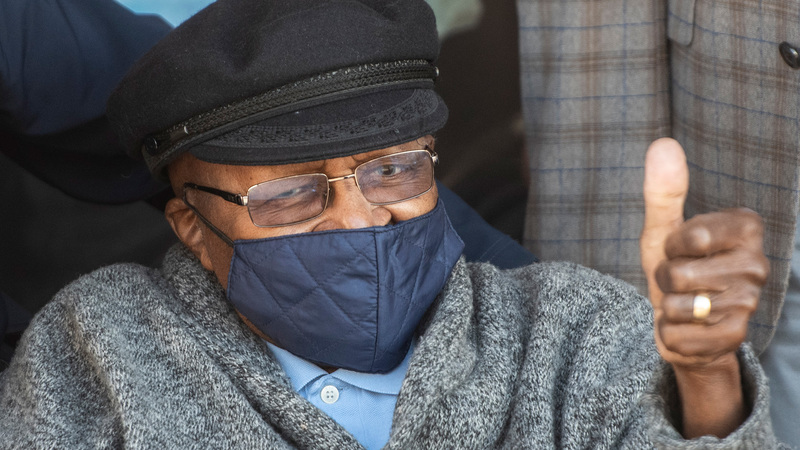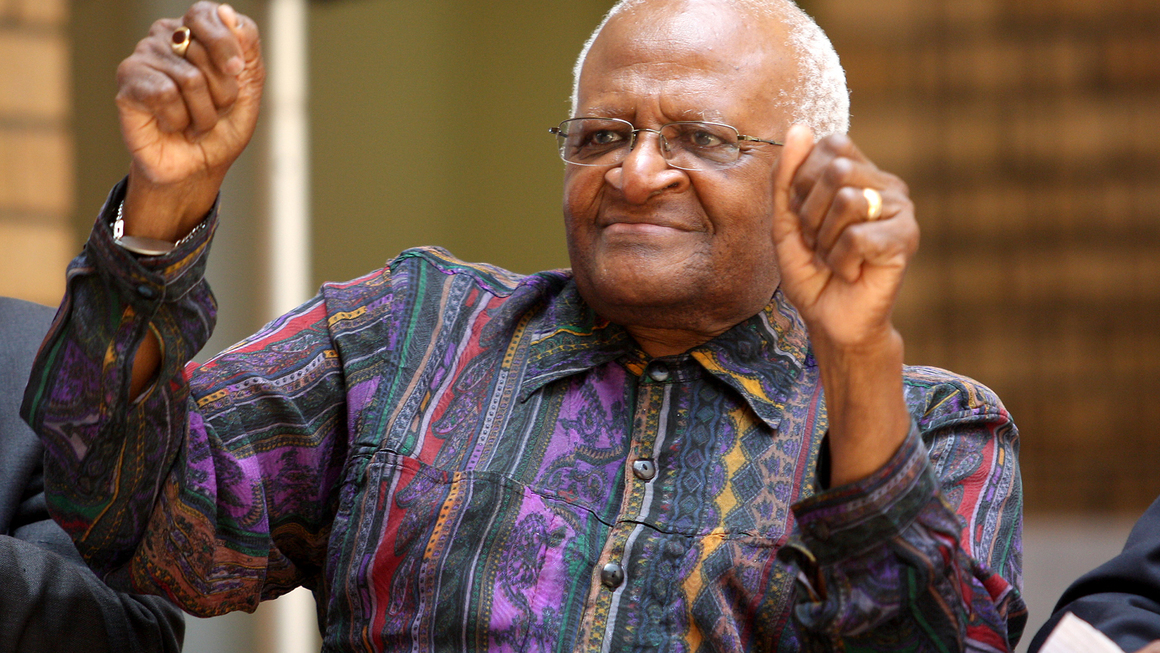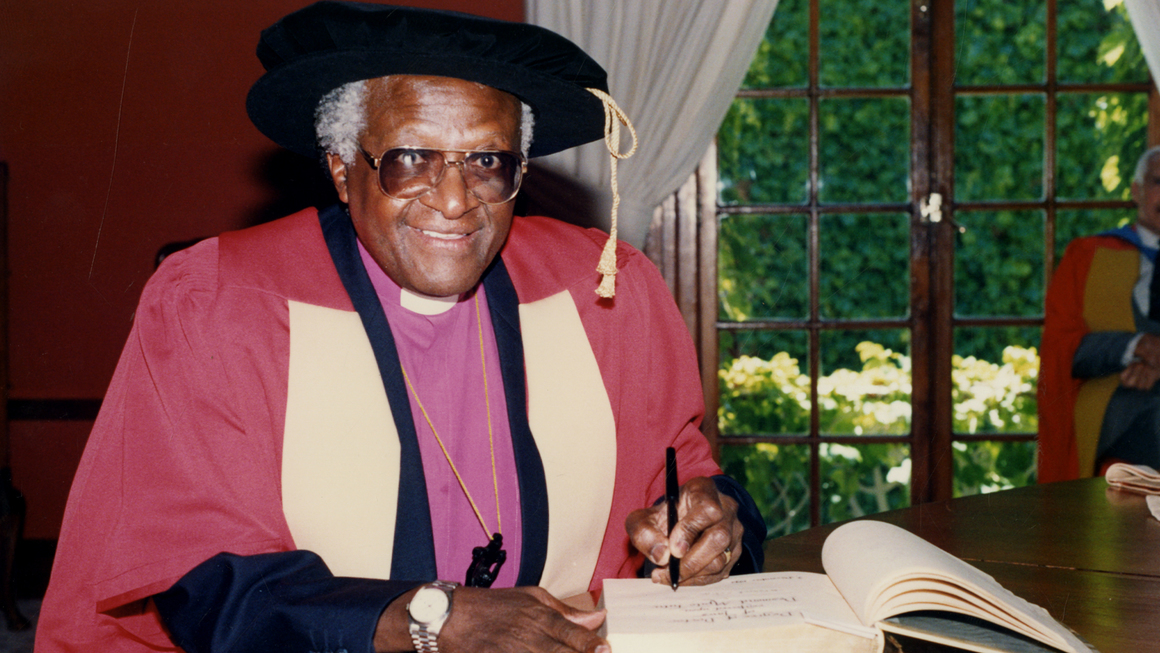Archbishop Emeritus Desmond Tutu: 1931–2021
26 December 2021 | Story Staff Writer. Photo University of Cape Town.
7 October 1931 – 26 December 2021
Archbishop Emeritus Desmond Tutu, who has died in Cape Town at 90, leaves a legacy commensurate with his stature as a towering figure in the theology of compassion.
His extensive association with the University of Cape Town (UCT) forms a considerable and meaningful part of his lasting endowment and his unprejudiced preoccupation with the spiritual and material well-being of people in South Africa and across the world.
He was a moral exemplar, and his convictions were unswerving, but he was scrupulous in preserving the scope for acknowledging the virtue of doubt, of questioning conventional or orthodox ideas and being willing to assume unpopular positions. He often did so, frequently with a leavening of humour – self-deprecating more often than not – that reinforced his persuasive thoughtfulness.
In a signature instance, he began a sermon on Doubting Thomas some years ago by saying: “Poor Thomas the Apostle has had a bad press. Now I know something about that. There’s the story of my sailing in a boat with (former president) PW Botha when his ever-present hat blew off. I got out of the boat, walked on the water and retrieved his hat. The following morning Die Burger declared in banner headlines: Tutu kan nie swem nie (Tutu can’t swim).”
The Arch, as he was fondly known, loved to make people laugh, especially when he saw an opportunity to help them think afresh, and be their best human selves.
Desmond Mpilo Tutu was born in Klerksdorp on 7 October 1931, the second of four children. His father, Zachariah, was a teacher, and his mother, Aletta, a domestic worker and, later, a cleaner and cook at a school for the blind. Both were significant influences in his early life, during which he contracted and beat both polio and tuberculosis, and learned the hard lesson of living in a family of modest means.
Financial constraints put paid to his early ambition to become a doctor and he chose teaching instead, graduating with a teaching diploma from the Bantu Normal College in 1954 and, a year later, a BA from Unisa. In the same year, he married Nomalizo Leah Shenxane and took a post at Munsieville High School, where his father was headmaster.
From teaching to theology
The depredations of the Bantu Education Act, however, preyed on him, and he resigned in protest, choosing to continue studying, this time in theology. He was ordained as an Anglican priest in 1961. Father Trevor Huddlestone is credited as having been a significant mentor.
In the early 1960s, Tutu went to Britain, completing bachelor’s and master’s degrees in theology at King’s College, London, and working as a part-time curate. Returning to South Africa at the end of the 1960s, he became chaplain at Fort Hare and, for two years from 1970, lectured at the National University of Lesotho.
Returning to Britain in 1972, Tutu was appointed vice-director of the Theological Education Fund of the World Council of Churches, but returned home three years later as Dean of St Mary’s Cathedral in Johannesburg.
He became increasingly prominent and outspoken through the 1970s, calling for sanctions against apartheid as a peaceful measure to bring change. He was made Bishop of Lesotho from 1976 until 1978, when he became Secretary General of the South African Council of Churches, a position that gave his mission national and international scope.
He was awarded the Nobel Peace Prize in 1984, an occasion he used to emphasise his conviction that “oppression dehumanises the oppressor as much as, if not more than, the oppressed. They need each other to become truly free, to become human. We can be human only in fellowship, in community, in koinonia, in peace.”
He demonstrated enormous courage a year later in Duduza on the East Rand when he led a few others in saving a man accused of being a police spy by a crowd who wanted to execute him.
In September 1986 Tutu was ordained as the Archbishop of Cape Town, becoming the first black priest to head the Anglican Church of the Province of Southern Africa.
The voice of the voiceless
In the final years of apartheid, he used his prominence to speak for the victims of repression and to appeal to the conscience of perpetrators. It fell to him, from his retirement as Archbishop in 1996, to lead the difficult, imperfect, but celebrated Truth and Reconciliation process, as a mammoth gesture of remembering, forgiving and healing.
Tutu is credited with crafting the term “rainbow nation” as a metaphor for a diverse but indivisible society capable, he believed, of achieving compassion and reconciliation and realising the ideal of ubuntu … “I am, because you are”.
From the second half of the 1990s, he campaigned extensively on matters of conscience and global concern, from HIV/Aids, tuberculosis and poverty to climate change, conflicts in the Middle East and elsewhere, homophobia, racism, sexism, corruption, family planning and assisted dying.
Tutu was described as “South Africa’s moral conscience”, a man that Nelson Mandela regarded as “the voice of the voiceless”.
In 2007, with Mandela, UCT Chancellor Graça Machel, former US president Jimmy Carter and retired UN secretary general Kofi Annan, among others, Tutu convened The Elders as a group of world leaders who could contribute their wisdom, kindness, leadership and integrity in confronting global problems.
He was lavishly honoured with prizes, awards and honorary degrees.
His association with UCT was deepened in 1993 when the degree of Doctor of Laws (honoris causa) was conferred on him.
In 2011 he became the second recipient – after former president Thabo Mbeki – of the Chancellor’s Award for Continental Leadership from Machel, an occasion on which university orator Alison Emslie Lewis captured the scale of Tutu’s role in describing him as “rabble rouser, servant of God, instigator, visionary, healer of the nation, professional beggar, courageous fighter, radical rock star, national and international treasure”.
By then he had long been a familiar figure on campus, not least in the naming of two centres of research, the Desmond Tutu HIV Centre, established in 2004 and the Nansen-Tutu Centre for Marine Environmental Research, launched in 2010.
The Desmond Tutu HIV Centre, which is under the umbrella of the Desmond Tutu Health Foundation (DTHF) – formerly the Desmond Tutu HIV Foundation – is committed to the pursuit of excellence in research, treatment, training and the prevention of HIV and related infections in southern Africa, and was involved in the HIV epidemic in Cape Town from the start. The centre is acknowledged in this critical public-health field, both nationally and internationally. Most recently, the DTHF changed its name as the scope of its work in public health research has widened to include research on other ailments that impact directly or indirectly to the fight against HIV. The need to widen the scope of research was further highlighted over the past year, prompting the foundation to adjust its research sites to incorporate COVID-19 research.
The Nansen-Tutu Centre advances knowledge of the marine environment and the climate system in the name of the two Nobel laureates, Tutu, and Norwegian Fridtjof Nansen.
Critically engaged to the end
Tutu was a frequent visitor to campus, as speaker, lecturer and panellist, contributing to and promoting initiatives such as the It Gets Better campaign, aimed at sexual minorities who experience discrimination; Fossil Free SA; and the student-run The Change Campaign, a drive organised by UCT’s Students’ Representative Council to foster a sense of social responsibility among peers.
He joined students in celebrating the 80th anniversary of Smuts Hall residence, was a guest of the UCT Graduate School of Business Corporate Learning 2009 Celebration, and a panellist in a fittingly titled discussion at UCT, “A Moral Imperative to Speak”.
In 2013 he followed in the footsteps of UCT scientist George Ellis in winning the prestigious Templeton Prize, awarded annually to “a living person who has made exceptional contributions to affirming life’s spiritual dimension”.
In 2015, the Desmond and Leah Tutu Legacy Foundation engaged in the Rhodes Must Fall debate, proposing on one hand the installation of a statue of Graça Machel on campus and, on the other, cautioning against the erasure of history and the risk of “obliterat[ing] a part of our common story”.
“We do not want to forget what happened to us. Our past has made us who we are,” the foundation said at the time.
To the end, Tutu remained critically engaged in South Africa’s present, speaking out fearlessly against inequality, violence and corruption, pinpointing the flaws and failures of the ANC government – memorably accusing it of “kowtowing to China” when it denied a visa to the Dalai Lama – and asserting the interests of ordinary people.
He determinedly held up to the country the vision of itself as “a scintillating success waiting to happen”, as he put it in his 2006 Steve Biko Memorial Lecture at UCT.
Throughout, he deferred praise for himself to his fellow South Africans, saying – typically – on receiving the US’s highest civilian honour, the Presidential Medal of Freedom, from Barack Obama in 2009: “I am standing out only because millions of my compatriots are carrying me on their shoulders.”
In that sermon on the doubting apostle in 2011, Tutu observed: “St Thomas urges us to be doubting Thomases who refuse to be hoodwinked, who refuse to be gullible, who refuse to be browbeaten. We are made for a great deal better.”
This is, in its way, a succinct summary of his own legacy, a life devoted to being courageous and hopeful, and instilling courage and hope in others.
He is survived by his wife, Nomalizo Leah, and their children, Trevor Thamsanqa, Theresa Thandeka, Naomi Nontombi and Mpho Andrea.
 This work is licensed under a Creative Commons Attribution-NoDerivatives 4.0 International License.
This work is licensed under a Creative Commons Attribution-NoDerivatives 4.0 International License.
Please view the republishing articles page for more information.
Archbishop Emeritus Desmond Tutu: 1931–2021
On Sunday, 26 December 2021, the University of Cape Town learned of the passing of Archbishop Emeritus Desmond Tutu, 90. We say goodbye to a man who taught us the power of joy to fight injustice and evil.
“Archbishop Emeritus Tutu, as he graciously aged, never lost his vision for a just and free South Africa.”
– Archbishop Emeritus Njongonkulu Ndungane
Stories from the UCT archives

It took UCT seven years to award the second Chancellor's Award for Outstanding Leadership in Africa - a reminder not only of the prestige of the accolade, but also of how few and far between worthy recipients have been.
12 Dec 2011
Caught up in the demands of their studies, students are often slow to volunteer for extra-curricula activities. To counter this, the university's student leadership hosted a week-long drive to foster a sense of social responsibility among their peers.
05 Sep 2011
In his valedictory lecture at UCT's medical school on 13 February, Professor Solomon Benatar of the Department of Medicine in the Faculty of Health Sciences, stated that the health of whole populations - in South Africa and globally - is <i>the</i> major crisis and challenge for humanity in the 21st century.
20 Feb 2008
With workmen in the background reminding guests of the newness of the hosting Wolfsohn Pavilion, the mood at the IIDMM headquarters was festive last Wednesday as Archbishop Emeritus Desmond Tutu and his wife Leah arrived to open an HIV centre there named in Tutu's honour.
09 Feb 2006








































